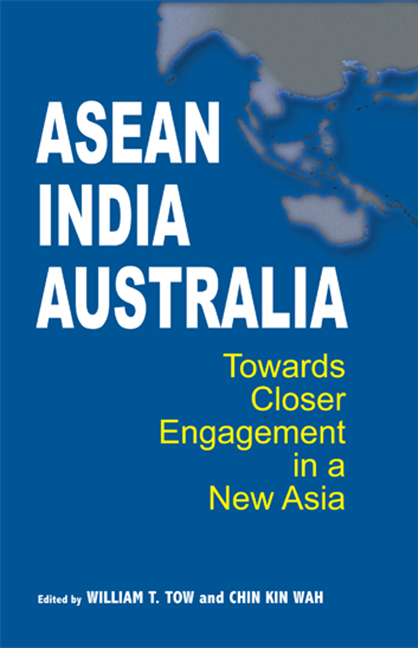Book contents
- Frontmatter
- Contents
- Preface
- Contributors
- List of Abbreviations
- Introduction
- Part I Emerging Regional Security
- 1 Emerging Regional Security Architecture: An Australian Perspective
- 2 Emerging East Asian Regional Architecture: ASEAN Perspectives
- 3 India in the Emerging Asian Architecture: Prospects for Security Cooperation with ASEAN and Australia
- 4 ASEAN, Australia, and India in Asia's Regional Order
- Part II Energy Security
- Part III Climate Change
- Part IV Maritime Security
- Part V Law Enforcement/Combating International Crime
- Conclusion
- Bibliography
- Index
4 - ASEAN, Australia, and India in Asia's Regional Order
from Part I - Emerging Regional Security
Published online by Cambridge University Press: 21 October 2015
- Frontmatter
- Contents
- Preface
- Contributors
- List of Abbreviations
- Introduction
- Part I Emerging Regional Security
- 1 Emerging Regional Security Architecture: An Australian Perspective
- 2 Emerging East Asian Regional Architecture: ASEAN Perspectives
- 3 India in the Emerging Asian Architecture: Prospects for Security Cooperation with ASEAN and Australia
- 4 ASEAN, Australia, and India in Asia's Regional Order
- Part II Energy Security
- Part III Climate Change
- Part IV Maritime Security
- Part V Law Enforcement/Combating International Crime
- Conclusion
- Bibliography
- Index
Summary
Can ASEAN, Australia, and India emerge as effective and influential drivers of Asia's pursuit for a stable regional order? This question is at the heart of this enquiry. Writing in 2003, G. John Ikenberry and Michael Mastanduno observed that essentially three actors would shape the current and future politics of the Asia-Pacific. Unsurprisingly, these actors were identified as the United States, Japan, and China. By most empirical and conceptual definitions of “power”, these three actors are genuine claimants to their position as the three most powerful actors in the international politics of Asia. But is this power singularly decisive and absolute?
The fact that the most powerful states of Asia are unable to translate their material capacities neatly into shaping the politics of the region on their own terms provides an important opening into understanding the limits of instrumental power in Asia, and of the purpose and function of regional projects and state-led regionalism in charting alternative paths to order. Indeed, the very fact that it could be argued that an emerging yet underdeveloped power such as India, an institutional conglomerate of states such as ASEAN, and a geographically removed “middle power” such as Australia, can be influential shapers of an evolving Asian order, is a reflection of the variable nature of “power” in international politics, as well as of the numerous means by which it can be leveraged. That such an argument can be ventured is equally a reflection of the achievements and possibilities that have been opened up by pursuing regionalism to counter the strategic uncertainties of the post-Cold War period. Admittedly, these achievements have been limited, with instrumental state concerns often obstructing the normative goals and aspirations of regionalism. But regional institutions and practices have, at the minimum, socialized regional diplomatic and defence elites, have offered a basis for organizing interstate cooperation, and have provided foundations for regional stability that reflect elements of both necessity and innovation in providing viable answers to the Asian region's search for stability.
- Type
- Chapter
- Information
- ASEAN-India-AustraliaTowards Closer Engagement in a New Asia, pp. 58 - 76Publisher: ISEAS–Yusof Ishak InstitutePrint publication year: 2009



